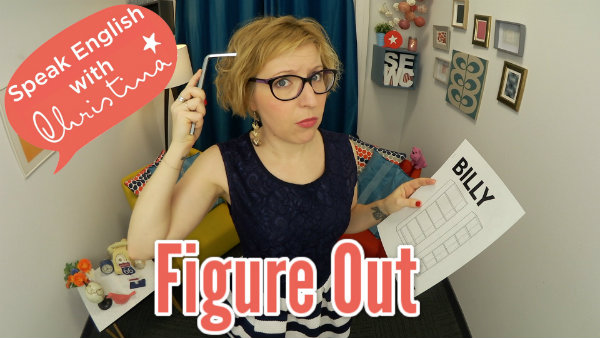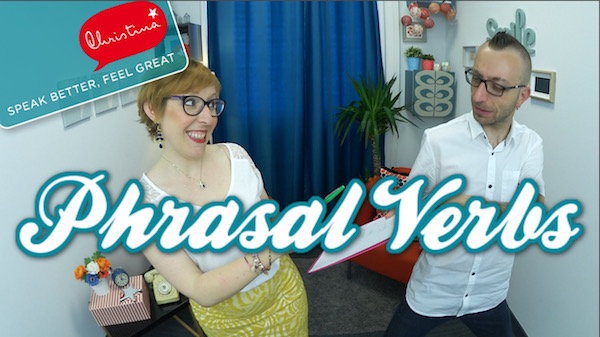
Hey there, and welcome to Speak English with Christina, where you’ll have fun becoming fluent in American English. I’m your English coach Christina, and the other day, I was working with a client, Ghislaine. In the first 3 minutes, expressions like “get to”, “get across”, and “get on with” came into our conversation.
Watch this episode now!
She exclaimed “There are so many phrasal verbs with get + preposition that I don’t know!” We use these expressions all the time, so with Ghislaine we thought you guys would enjoy this episode on phrasal verbs with “get”.
Let’s go! And our first phrasal verb for today is…
To get to / to get into
This verb means “to arrive at a place”, and you can use “arrive”, but in casual conversation it’s a lot more common to say “get to” or “get into.”
For example, you’re going to New York City for your vacation (lucky, lucky you!), and you tell your friends “I get into New York at 3 o’clock.”
We also use “get to” or “get into” in more everyday situations too, like “What time do you usually get into work?” or “What time do you usually get to work?” Me, I usually get to work at around 7:30 or 8. And you?
To get across
Here, we’re talking about the figurative sense of “to get across”, which is “to communicate.” We often use this as part of the chunk “to get your message across”, to communicate your message.
Maybe you feel like it’s hard to get your precise message across in English because you lack vocabulary. Or you want to get your message across quickly, but you have to think to find your words.
Well, now you know one more expression: “to get your message across”, to communicate your message.

To get on with
I was looking for some good examples for the expression “to get on with…”, so what did I do? I googled the expression!
Let’s see if you can guess the meaning of this expression, with some real-life examples: A title of an article in Psychology Today: “How to stop worrying and get on with your life.”
An article from the British newspaper The Guardian: “Ringo Starr wants the British to get on with Brexit.”
And from the site Inc.com “8 ways to run effective meetings so you can get on with your day.” Did you guess? To get on with something means to proceed with, to continue.
To get back
I know you know this song: “Get back, get back! Get back to where you once belonged!” You know, the Beatles song! And the expression “get back” means “to return to a place.”
Earlier, we you learned “get to”, to arrive. Well, if you get into work at 8, maybe you get back home at 6. Or after your vacation in New York City, you want just one thing, to get back to the Big Apple soon.
There are also other definitions of “to get back”, but this one, “to return”, is probably the most common.
Curious to see how well (or badly) I sing the Beatles? Watch the episode!
Now, what about you?
What other expressions with “get” do you know? Share your knowledge with the Speak English Community in the comments below!
Give us one expression, and one example. Use your expression in a sentence!
If everyone contributes one example, you’ll all learn so much!
Let me help you understand 12 everyday expressions that Americans say fast.
Get my free pronunciation and comprehension lesson with exercises.
And of course subscribe to my channel, so you get a new English lesson each week! Thanks for watching Speak English with Christina, and I’ll see you next time!
More English lessons...
Click the image to see the lesson








Get on the wifi and get a move on with Christina. Nothing gets better than this. Don’t get the wrong end of the stick. Get your English across. Don’t get behind. Let’s get down to business. Get in and get into the ride of your lifetime. Get on with your learning journey. Get back to me soon. Don’t get out of touch! Let’s get through it. Get up and get together now.
Get over
Hello,
Thanks to teach us American english. Frenchies have a great chance to get you as teacher !
Can you answer to these two questions about your video ” 4 Phrasal Verbs with Get “please ?
1. Sometime for ” to get into “, I hear ” geLenƏ “, sometime I hear ” getDenƏ “. Can you tell us if the sound is L or D please.
2. In your video, position 1’27, you said ‘for example’ and I hear ‘for Temple’ ! Can you tell us the phonetic pronunciation you use please ? I suppose, I am not alone.
Thanks a lot
You are very welcome, and I would say that I’m very lucky to live and work in France too!
To answer your very smart questions:
1. The more common pronunciation of “to get into” would be getDenƏ because the “t” of get connects with the “i” of into, and it becomes a /d/ sound. It’s what we call the “Flap T” in English, where a “t” sounds like /d/ because of the vowels around it.
2. As for the pronunciation at 1:27, I can offer 2 possible explanations:
A. In spoken English, the liaison between “for” and “example” eats the /e/ sound of “example”. This means that the sound of the “x” is harder and sounds almost like a /t/ sound.
OR
B. I simply tripped over the word & the pronunciation, which is very possible as well! It happens to all of us!
And that’s why I always tell learners not to put too much pressure on themselves to speak perfectly.
No one speaks perfectly. Native speakers make tons of mistakes, and spoken English is very forgiving of these things. What counts is the understanding, the communication, the message.
Definitely not the perfection of the language!
Get along (with)
I’m getting along with Pete. We see eye to eye.
Get through
I get throught my homework which means that I have been able to do ” all “my homework.
halo i’m indonesian,not very well and good in english conversation,i was just know a few vocabulary the words in english and also bad on grammer,for just information at this sentence of my conversation actually i was just imitate the sentence in english conversation the first thanks for your video at learning english language,you’r doing the best,my question is how i can speak in english conversation in small talk
your sincerely
regards
Hi Christina,
How much I enjoy your videos!!!!
Now, my little contribution: “Once we have all the information we need, we´ll be able to come down to the discussion”.(get down= begin, start).
Thank you so much, Chistina!!!
Gabi.
Hi Christina. Fortunately I’m retired and consequently I don’t need to get to work anymore. It’s like a reward for being old. Thanks for your always useful and lovely videos.
how lucky i am for knowing and having this SPEAK.ENGLISH WITH CHRISTINA. I learn a lot of English word for free. thanks God and thanks to you ms. c hristina. God bless!
Hi Rachel, Thanks and I’m glad to know that you’re improving your English with me. What is ONE thing that you’ve learned, and how has it helped you in your life? I’m curious!
Firstly I wanna thank you for the video. I got some expressions I didn’t know nor hear before. Once again thanks a lot. My expression with get is. Get up: standing on your feet. I usually get up at 6:00am everyday.
Hi Calixte, great, I’m glad that you got some new expressions from this episode! And your example is perfect, great job!
my favorite is: to get rid of something or someone
= to remove something that you do not want any longer:
it´s high time to get rid of this old computer
Ooh, I think that’s my favorite too! I’m always trying to get rid of old stuff that I don’t need (and then avoid buying more stuff that just replaces it). Great example because it’s a very useful expression!
get up :
if you get to work at 8, at what time do you get up?
get in, get through :
and if you got up late, don’t get in hurry and get through the bathroom door.
I think to get is one of the word American people use the most. At my first stays I heard it every time and looked for the meaning to give it!
have a good day
Dom
Hi Dom! I get up at 5:50 AM. I just can’t seem to get to 5:45! And yes, if you get up late, you won’t get through the bathroom door before everyone else!
And you’re right, “get” is a very, very common word in English, right up there with “do” “have”, and all forms of “be”. The difficulty is that “get” has soooooo many meanings!
As soon as I saw “get back” was one of the verbs, I had the Beatles song in my head before I even read the paragraph – I swear! At least that makes 1 of these 4 phrasal verbs easy to learn and remember!
I know, right? I think it’s such an ingrained cultural reference that when you hear “Get back” you can’t help but singing it (in your head at least…)
Thanks Christina for this more than useful episode! I live in the US and I confirm the verb “to get” is one of the most commonly used verb and phrasal verbs have always been a nightmare for me to remember.
We can add to this very long list of expressions:
– to get off…I get off the train and walked out of the train station to get a cab…meaning to go down (ugh, another phrasal verb to explain a phrasal verb;-)!);
– to get along with someone…meaning to have a good relationship with someone.
Dear Christina,
I am a new follower and I have to say how much I love your episodes and vidéos. I got to learn more and practice everyday! You are an amazing person! Thank you so much for your time and support!
The expression I like most with the verb to get is “to get off with the wrong foot” whenever I can´t make a student of mine understand a subject we are dealing with.
Thanks so much for this new post, by the way, Christina. It´s great!!!
Thanks Christina for all doing your sharing I need to have long conversation with people .thank you Christina against
Hello Cristina and everybody here
I am a Spanish native speaker and life learner of English as Foreign Language. It´s crazy how many meanings “get off” have in Spanish.
Here I send the link : https://www.google.com/search?q=get+off&oq=get+off&aqs=chrome..69i57.4894j0j7sourceid=chrome{google:omniboxStartMarginParameter}ie=UTF-8 ,
and maybe you´d like to see by yourself.
Hugs and blessings from Pereira, Colombia
Hi Christina,first of all I like to say that I like your tips and your speaking style too.iam a science teacher .I have good command on my subject.but due to Hindi background I am not good in English conversion. But in class I always use ‘got it’for are you understand me.is it right to use this.thank u
Sorry its conversations
I’ll just add the expression, “to get by/get by”. It means to accomplish something with the least possible effort. Sentence example: How can he get by with only a little penny? Everyone please feel free to correct me if I’m wrong :))
Great expression Keziah! Thanks for teaching it to the community <3
Dear Cristina,
Thank you so much for your free English lessons.
I am professor of mathematics, unfortunately, I have difficulties in presenting paper in a conference.
Please let lean it correctly.
With my best regards,
Dear Christina,
Thank you so much for your free English lessons.
I am professor of mathematics, unfortunately, I have difficulties in presenting paper in a conference.
Please let lean it correctly.
With my best regards,
I got into FFCC a little more than one year ago.
I decided quickly to use GET as much as possible because I thought it would help me think in English.Initially I replaced some verbs by GET.
Easy with “become” before an adjective : it’s getting dark, I’m getting married etc……
Easy, as well, with “understand and receive ” before nouns : I got it, did you get the mail I sent you etc…..
More difficult with arrive, buy, obtain : I get home,I got these shoes Barcelona, I got a new job etc….
Special to replace ” to be” with a passive form : I got my car stolen, I got accepted to the job
And finally to get to + a verb : to have the opportunity : Every day, when I speak to myself, I “get to” use GET and Phrasal Verbs
Naturally all the Phrasal Verbs are so easy to use in conversation that I enjoyed learning them ( only ten of them)